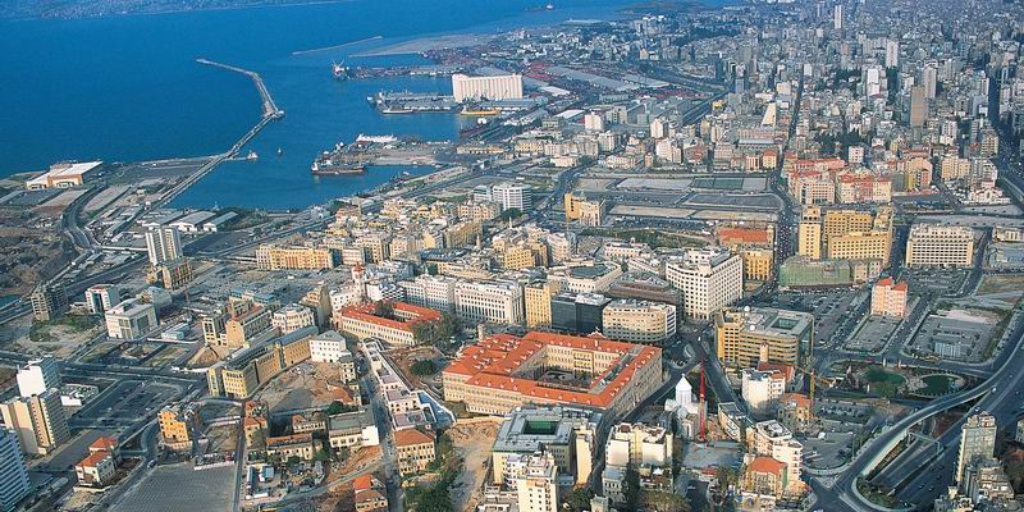The explosion in Beirut: why was so much dangerous ammonium nitrate sitting in a warehouse for six years?
Lesson summary
Hi there, this is Plain English Lesson number 286. I’m Jeff; JR is the producer; and the full lesson can be found at PlainEnglish.com/286.
On today’s lesson, we’ll talk about what happened in Beirut: a massive explosion in the city’s port left dozens of people dead and countless others injured or homeless. And all because a warehouse held a huge cache of a highly flammable chemical that nobody even wanted. Our expression is “pass through” and we have a quote of the week.
Explosion in Beirut
A cataclysmic explosion devastated Beirut, the capital of Lebanon, on August 4 after a warehouse full of ammonium nitrate exploded, killing over 150 people, injuring thousands, and leaving about 300,000 people homeless. Ammonium nitrate is a highly flammable chemical used to make fertilizer.
Two explosions took place at the Port of Beirut that day; a small one, followed by a much larger one at 6:08 p.m. local time. The second blast was felt as far away as Cyprus and its force was equivalent to a 3.3-magnitude earthquake.
Survivors said it felt like an earthquake: buildings shook violently, glass shattered, furniture toppled, and some structures collapsed. Many people in the immediate area were thrown from their feet and injured by falling objects or broken glass. Others were trapped under collapsed buildings. Hospitals quickly filled up; patients were transported to hospitals outside the city for emergency treatment. One of the city’s biggest hospitals, St. George Hospital, was so damaged it had to stop accepting patients.
Because streets were blocked, many of the injured had to walk themselves to the hospital. Doctors told one woman with a head injury that she had inadvertently swallowed a liter of her own blood on the walk to the hospital. Rescue workers went door-to-door in the hardest-hit areas well into the night of August 4 and into the next day, as they continued to find people trapped and injured.
The explosion was caught on video from several vantage points, including the rooftops of nearby buildings. These videos showed the plume of black, white, and orange smoke rising from the port area.
Downtown Beirut was badly scarred by the explosion. Photos show collapsed buildings, piles of rubble, broken glass, uprooted trees, and debris strewn in every direction. Homes and cars were damaged even far away from the blast site. The day after the explosion, photos showed the port completely flattened, except for a set of heavily damaged grain silos.
Beirut is an important seaport in the Middle East. It’s on the eastern edge of the Mediterranean Sea; before the blast, over half of Lebanon’s imports passed through this one port. The city is home to between one and two million people and the port is located just a few kilometers from the heart of the city, and just meters from a populated residential area.
Why was there explosive material sitting in a warehouse in the middle of a teeming metropolitan area?
The material was confiscated from a cargo ship in 2014. The ship was headed from Georgia to Mozambique when it made an emergency stop in Beirut in late 2013 due to mechanical issues. Government inspectors in Beirut saw the ship was damaged and declared it unseaworthy, meaning that it could not continue its journey. The owner of the ship didn’t claim the cargo and made no effort to recover the ship or its contents, so the cargo was transferred to a warehouse at the port of Beirut in early 2014.
That is where it sat—in Warehouse #12—for over six years, without proper safety or security measures, until it exploded this month. Preliminary reports said the explosion was triggered by construction work nearby; a spark from a welding operation set off the blast, according to one report. A conflicting report said that a fire broke out in a warehouse nearby and spread to Warehouse #12, where the ammonium nitrate exploded.
Shortly after the blast, a letter appeared online. It was written by the head of customs at the port of Beirut. In the letter, he warned that it was dangerous to have such high levels of explosive material in storage at the port and was concerned for the safety of port employees. He asked a judge what could be done with the chemicals and even proposed exporting it or selling it to an explosives company. The letter appeared authentic but it hasn’t been confirmed yet. Because it is so dangerous, ammonium nitrate is heavily controlled in most countries.
Americans and Chinese will recognize the power of ammonium nitrate explosions. In 2015, a series of explosions hit the Port of Tianjin, not far from Beijing. Fires burned for an entire weekend as eight subsequent explosions went off; over 100 firefighters were killed in the attempt to control the fires in Tianjin.
The worst industrial accident in American history took place in 1947, when a ship carrying ammonium nitrate exploded in a port in Texas, leading to a domino effect of other explosions and fires. One of the biggest domestic terrorist attacks in America’s recent history was the bombing of a government building in Oklahoma in 1995. A truck bomb containing just two tons of ammonium nitrate exploded, killing over 168 people in a government office building.
Great stories make learning English fun

